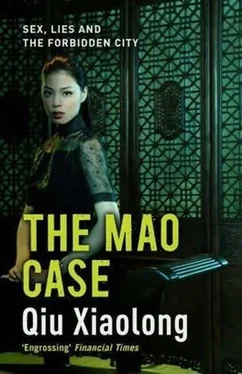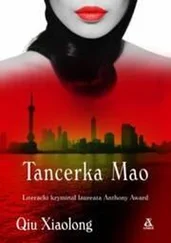In his middle school textbook, he had read about the park once having at the entrance a humiliating sign: No Chinese or dogs allowed. That was at the beginning of the century, when the park was open only to Westerners. After 1949, the Party authorities used the story as a good example for lessons in patriotism. Chen wasn’t so sure about the authenticity of the story in his textbook, but now it was pretty much true: No poor Chinese allowed.
Finally, when he reached the back of the park, he succeeded in finding something like a stone stump, which was placed there to connect the links of a chain along a winding trail. For him, it served as a seat. Not far away, a young mother was sitting on another such stump with a baby sleeping in an old, worn-out stroller beside her. She had kicked off her shoes, her bare toes grazing the edge of the green grass. Gazing at the baby with affection, in profile she bore a slight resemblance to Shang.
Had Shang come here with Qian? Perhaps Shang didn’t sit on a stone stump, and her baby didn’t sleep in a ramshackle stroller but had she been as happy, contented?
After all, meaning and essence for each individual life doesn’t depend on something divine or imperial. The unfortunate life of Shang an emperor’s woman, was an example.
Chen took out a cigarette, but he didn’t light it, casting another glance at the baby. The unlit cigarette between his fingers, he felt as if the park had been exercising a subtle effect on him, felt himself thinking with greater clarity.
Yu had sometimes joked that the park must be a place with auspicious feng shui for the chief inspector. As early as the seventies, Chen had started studying English in the park, an experience that led to many things in his life. He didn’t believe in feng shui, but that late afternoon, tapping the cigarette on the back of his hand, he wished he could see some signs of it in the park.
He got up and moved over into the shade of a flowering tree, where he dialed Liu.
“What’s up, Comrade Chief Inspector Chen?”
“Among the people Song approached in the last few days, was there someone in the real estate business?”
“No, I don’t think so.”
“Or someone surnamed Hua?”
“I’m not sure. Song talked to a number of people. How am I supposed to remember all of them offhand?”
“Can you check for me?”
“Well, I’m not in the office…”
Wherever Liu might be at the moment, Chen thought he heard music flowing like gurgling water and girls’ laughter like drifting boats in the background.
“Please find out for me as soon as possible, Comrade Liu.”
“I will, Comrade Chief Inspector Chen,” Liu said with an edge in his voice. “But we’ve discussed our plan, haven’t we?”
For Liu, Chen’s request must have sounded like another tactic for stalling.
“Yes, we have,” Chen said, “but you haven’t gotten the search warrant yet, have you?”
Afterward, Chen made his way back to the curved walkway above the water, breathing in the air with its characteristic tang from the river. He had done everything possible. Internal Security would take action the next day. Barring a last-minute miracle, the chief inspector would have no choice but to walk away from the case.
He turned around slowly, facing the sight of the pyramid-shaped tower of the Peace Hotel across Zhongshan Road. A gothic-style hotel built by Sassoon, a legendary Jewish businessman in the twenties, it was a soaring symbol of the then most sumptuous building in Shanghai. In the fashionable nostalgia of the city, stories about the extravagances associated with the hotel were becoming elaborate myths. He wondered whether the notorious jazz band of Shanghai Old Dicks would perform in the hotel bar that night. After nearly two weeks at Xie’s place, he had little interest in going there.
Then his cell phone rang, the sound almost lost in the siren coming from near the river. It was Peiqin.
“What’s up, Peiqin?”
“I’m at Jiao’s place, preparing another dinner – for two, that’s my guess.”
“Tonight?”
“Yes, to night. Jiao said she won’t be back until after eight.”
Chen glanced at his watch, almost mechanically. “You’re sure about the time of her return.”
“I have to make sure that the rice remains warm until she gets back. She was quite particular about that.”
“That’s something, Peiqin,” he said, thinking of what he had discussed with Old Hunter, who swore that he had seen a man in Jiao’s room – though only in a fleeting glimpse – the last time she had “a dinner for two” at home. “Have you told Old Hunter about it?”
“I have. He’ll be patrolling the area to night. He told me that the information could be important to you.” She added, “Oh, I’ve made a list of what’s unusual in her place. Do you think it might be useful?”
“Of course. Really useful. Can you fax it to my home?”
“Yes, a copy shop can fax it for me.”
“I don’t know how to thank you, Peiqin.”
“Don’t mention it. I don’t know anything about your investigation, but working at her place, I’ve learned a few new recipes. Come to our place this weekend.”
“I’ll think about it, Peiqin.”
“Take good care of yourself, Chief. Bye.”
Peiqin was concerned about him. He could guess why. He hadn’t been to their place for weeks. But his heart sank at the thought of the weekend, by which time her generous help would have come to nothing. He lit the cigarette he had been holding for a long while, inhaling deeply. He was bothered by a feeling of having missed something in the Mao Case. Something elusive, but essential. Peiqin’s phone call had intensified the feeling.
Perhaps the park was really an eventful place for him, whatever the feng shui. He had hardly put the phone back into his pants pocket when it rang again. It was Ling, from Beijing.
“Where are you?” she said, sounding so close, like water lapping at the shore. “I called your hotel, but you had checked out.”
“I had to rush back to Shanghai. Sorry, I didn’t have time to say goodbye to you, Ling. I took the night train, and it was too late to call when I got on it at the last minute.” He went on, grasping the phone, “I’m at Bund Park. The park we visited the last time you came to Shanghai, remember? I really appreciate your help. It made a huge difference to my work.”
“I’m glad it made a difference to your police work. You can be exceptional in what you choose to do, Chief Inspector Chen. So be an exceptional policeman,” she said, her voice suddenly distant again. “Perhaps it’s like the poem you wrote, in imitation of a British poet as I remember, about the urgency of making a choice,” she said. “You have to choose your play / Or time will not pardon -”
“I’m so sorry, Ling,” he said, aware of her resignation, after all they had gone through, to his being a cop first, before anything else.
“Keep in touch when you are not that busy. And take good care of yourself.”
“I’ll call you -”
A click. She already hung up.
But what choice did he have? Again, a cicada chirped in the verdant summer foliage behind him. Sad it’s no longer sad, / the heart hardened anew, / not expecting pardon, / but grateful, and glad / to have been with you, / the sunlight lost on the garden.
That was the last stanza of the poem she had just mentioned on the phone. In the end, he had no choice except to redeem himself by being a cop.
It came as an answer, however, and not just to that question. In a dazzling illumination of the instant, a new possibility presented itself to him.
He turned and set out for the park security office in haste, where he showed his badge to a gray-haired man sitting at a long desk.
Читать дальше












